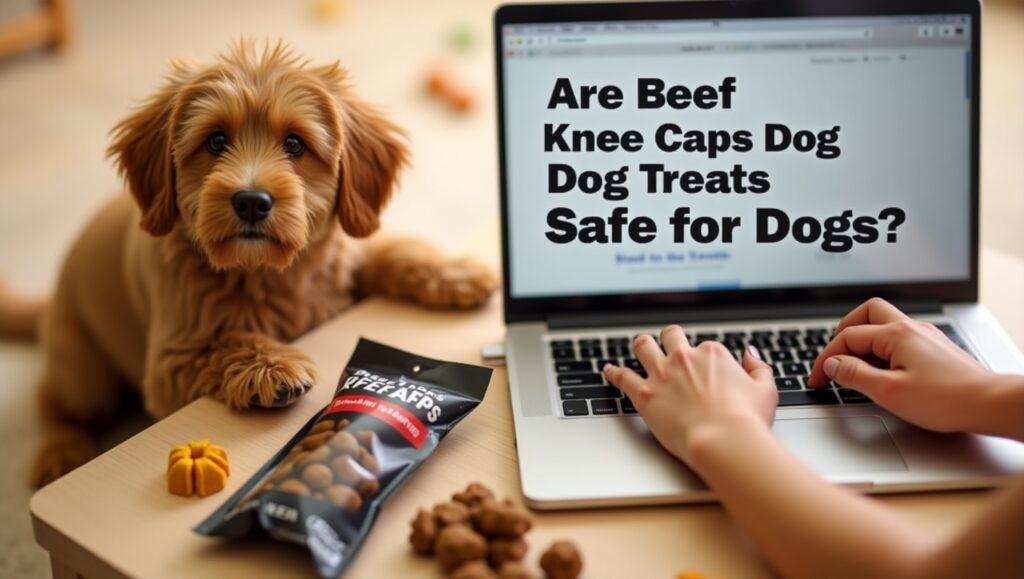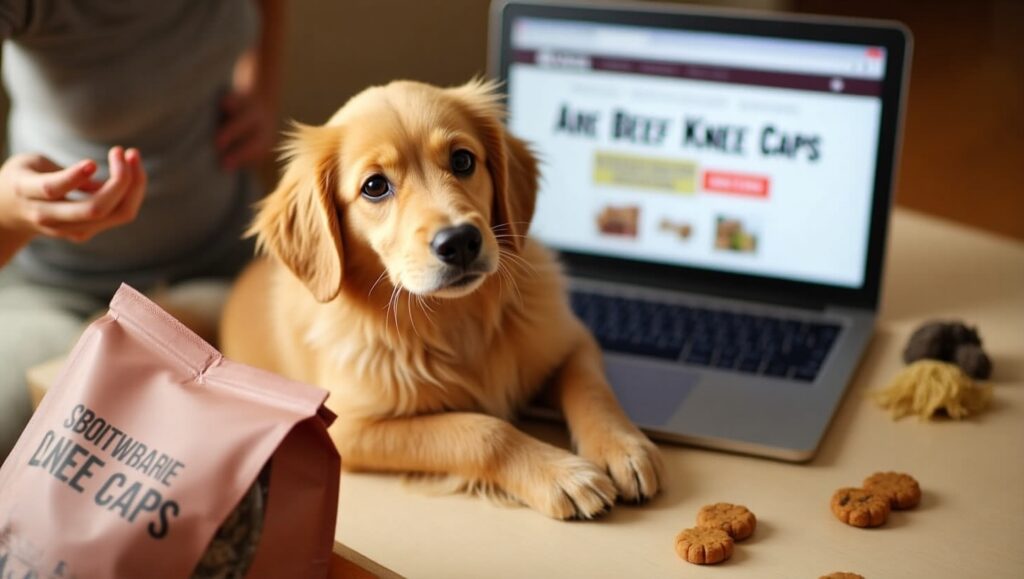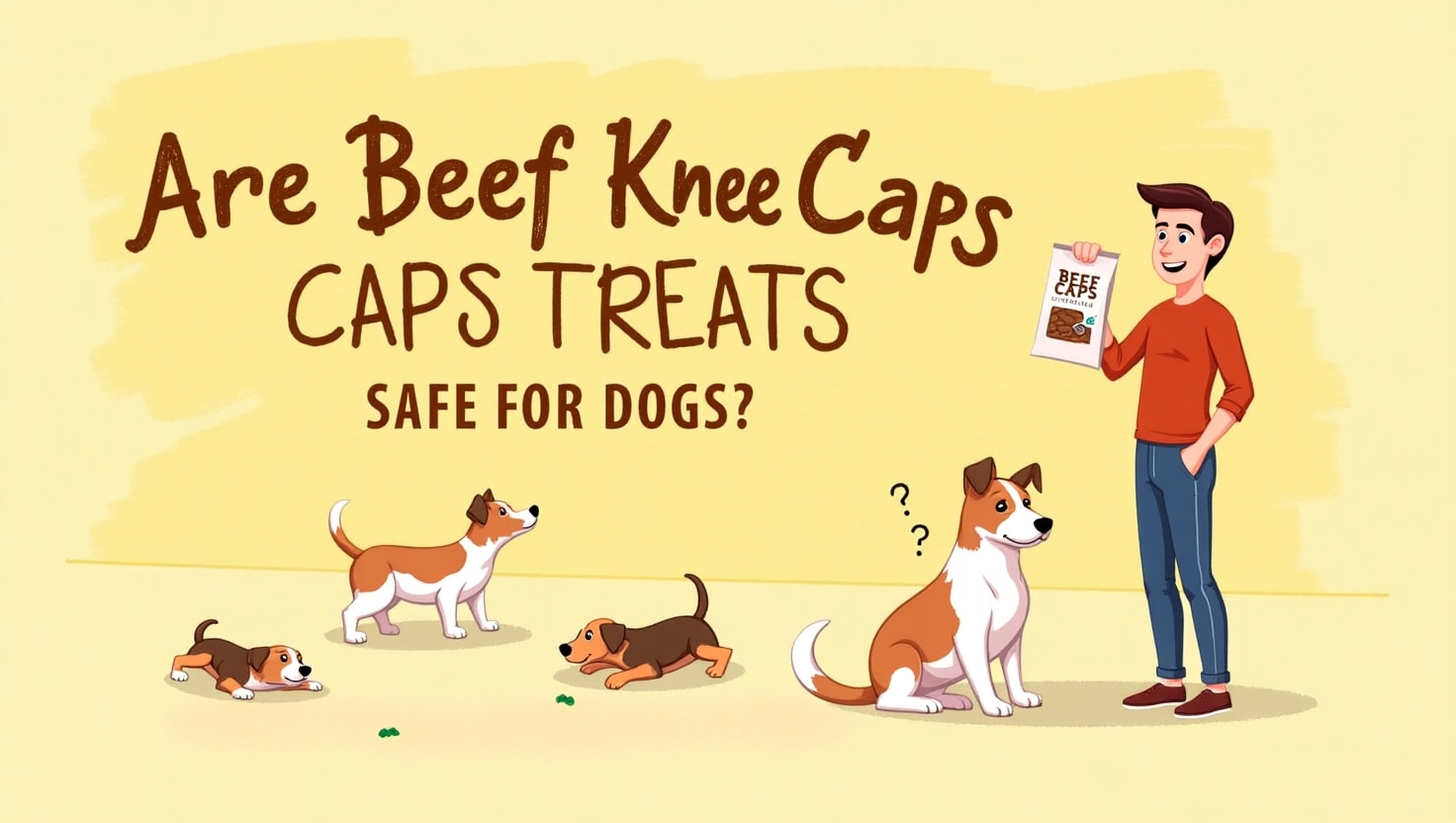Introduction
As dog owners, we want to give our furry friends treats that make them happy, keep them entertained, and benefit their health. Beef knee caps are a popular option among dog chews, but are they truly safe? In this article, we’ll dive into the benefits and potential risks of beef knee caps and other dog treats, helping you make the best choices for your canine companion.
What Are Beef Knee Caps for Dogs?
Description of Beef Knee Caps
Beef knee caps are natural bones taken from the joint areas of cows. They are typically processed by smoking, drying, or roasting, creating a hard chew that dogs love. These treats are known for their durability and are often promoted as a healthier, natural alternative to processed chews.
Nutritional Benefits
Beef knee caps are packed with essential nutrients like protein and calcium. The small amount of marrow inside adds flavor and offers additional nutritional value, making them an appealing and rewarding snack for your dog.
Are Beef Knee Caps Safe for Dogs?

The Benefits of Beef Knee Caps
- Promotes Dental Health: Chewing on hard bones like knee caps helps scrape away plaque and tartar, keeping teeth clean and gums healthy.
- Mental Stimulation: Dogs are natural chewers, and treats like knee caps help satisfy this instinct while keeping them occupied.
- Natural Composition: Beef knee caps are minimally processed and don’t contain artificial additives or preservatives.
Potential Risks
- Choking Hazard: Pieces of the bone may break off, especially as the bone wears down, posing a choking risk.
- Splintering Danger: When chewed aggressively, bones can splinter, which may cause injuries to the mouth, throat, or digestive system.
- High Fat Content: The marrow inside is fatty, which can upset sensitive stomachs or contribute to weight gain if consumed in excess.
Are Beef Bone Treats Safe for Dogs?
Different Types of Beef Bone Treats
Beef bone treats include raw bones, smoked bones, and processed options infused with flavors. Each has its own benefits and risks.
Safety Considerations
Raw bones are generally safer because they are less likely to splinter compared to cooked bones. However, they still require supervision to ensure your dog doesn’t bite off or swallow large pieces.
Are Beef Hide Treats Safe for Dogs?
What Are Beef Hide Treats?
Beef hide, commonly known as rawhide, is made from the inner layer of cowhide. These treats are processed into rolls, chips, or twists for dogs to chew.
Benefits and Risks of Beef Hide Treats
- Benefits: They are long-lasting, provide dental benefits, and satisfy a dog’s natural chewing instincts.
- Risks: Some rawhide products are treated with chemicals during processing, which may not be safe. Additionally, if a dog swallows large chunks, it can cause blockages in the digestive system.
How Often Can Dogs Have Knee Caps?
General Recommendations
Beef knee caps should be given as an occasional treat, such as once or twice a week, depending on your dog’s size, age, and overall health. Overfeeding any type of bone treat can lead to dental wear or digestive issues.
Factors to Keep in Mind
Consider your dog’s chewing habits and dental condition. For aggressive chewers, limit the frequency to prevent excessive wear on their teeth.
What Are the Safest Chew Bones for Dogs?
Veterinarian-Recommended Options
Veterinarians recommend options like raw bones, specially designed dental chews, and rubber toys. These alternatives minimize the risks associated with splintering while still providing chewing satisfaction.
Natural vs. Synthetic Chews
Natural chews like beef knee caps or bully sticks are appealing due to their flavor and nutritional value. However, synthetic chews, such as nylon bones, are designed to be safer and more durable for heavy chewers.
What Is the Knee Cap Problem in Dogs?
Understanding Patellar Luxation
The term “knee cap problem” typically refers to patellar luxation, a condition where the kneecap slips out of place. This issue is more common in smaller breeds but can affect dogs of any size.
Symptoms and Prevention
Symptoms include limping, skipping steps, or avoiding putting weight on one leg. Keeping your dog at a healthy weight and ensuring regular exercise can help prevent or manage this condition.
What Do Vets Recommend for Dogs to Chew On?
Best Chew Treats According to Experts
Veterinarians often suggest safe options like dental chews, bully sticks, or rubber toys designed for chewing. These treats are effective at cleaning teeth and satisfying chewing needs without the risks associated with bones.
Safe Alternatives
Frozen fruits like carrots or apple slices (without seeds) can also serve as a healthy and safe chewing option.
What Kind of Bones Are Not Safe for Dogs?
Avoid Cooked Bones
Cooked bones, such as chicken or pork bones, become brittle and can splinter easily. These sharp fragments can cause internal injuries or blockages in your dog’s digestive system.
Small, Sharp Bones
Small or thin bones, like those from poultry, are especially risky and should always be avoided.
Is Beef Scalp Safe for Dogs?
Benefits of Beef Scalp Chews
Beef scalp is a highly digestible and protein-rich chew that can benefit dogs. It’s a natural and long-lasting option for dogs who enjoy chewing.
Risks to Be Aware Of
Make sure the beef scalp you choose is free of chemicals or preservatives. Always select a size that matches your dog’s chewing strength to avoid choking or swallowing large pieces.
How to Choose the Right Chew Treats for Your Dog

Matching Size and Strength
Pick chew treats that are appropriately sized for your dog. Large dogs need larger and more durable chews, while smaller dogs require softer or smaller options.
Reading Labels
Always check labels for harmful additives, preservatives, or chemicals. Stick to natural options whenever possible.
Signs of Problems with Chew Treats
Digestive Upset
If your dog shows signs of vomiting, diarrhea, or constipation after chewing a treat, discontinue use and consult your vet.
Dental Damage
Broken or cracked teeth can result from overly hard chews. If you notice changes in your dog’s chewing habits, have their teeth examined by a vet.
Tips for Safe Chewing
Supervise Your Dog
Never leave your dog unattended while chewing. Supervision helps prevent accidents like choking or swallowing large pieces.
Rotate Chew Options
Offer a variety of treats to keep your dog engaged and avoid overuse of one type of chew.
Conclusion
Beef knee caps can be a safe and enjoyable treat for your dog when used responsibly. Always choose high-quality products, supervise chewing sessions, and consult your vet if you have concerns. With the right precautions, chew treats can provide your dog with mental stimulation, dental benefits, and endless tail wags.
FAQs
1. Are beef knee caps good for puppies?
No, they are too hard for puppies and can damage their developing teeth.
2. Can beef hide cause digestive issues?
Yes, especially if a dog swallows large chunks or if the product contains harmful chemicals.
3. How do I know if a bone is safe for my dog?
Look for bones labeled as raw or natural and avoid cooked or brittle bones.
4. How often should I replace chew treats?
Replace chews once they become small enough to pose a choking hazard.
5. Are synthetic chews better than natural bones?
Both have pros and cons. Synthetic chews are more durable and safer for aggressive chewers, while natural bones offer flavor and nutrients.

